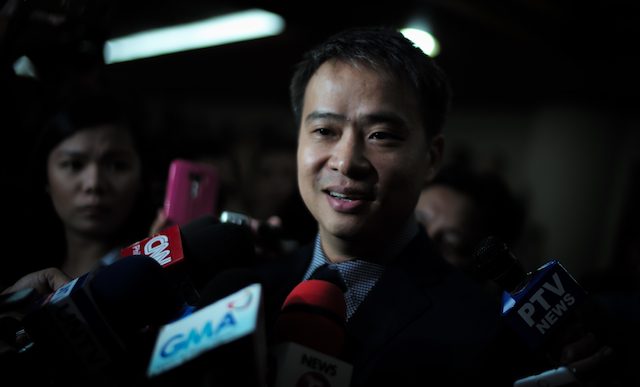SUMMARY
This is AI generated summarization, which may have errors. For context, always refer to the full article.

MANILA, Philippines – The Senate “cannot and should not” implement the dismissal order of the Office of the Ombudsman against Senator Joel Villanueva, the Senate’s legal counsel said.
Senate lawyer Maria Valentina Cruz gave the opinion on Tuesday, November 29, after the Senate referred the case of Villanueva to the Senate committee on rules.
“Our office is of the opinion that the penalty of dismissal cannot and should not be implemented on both procedural and substantive grounds,” Cruz said in her opinion.
On November 14, the Ombudsman ordered Senate President Aquilino Pimentel III to implement the dismissal order after finding Villanueva liable for misuse of pork barrel funds when he was a party-list representative in 2008.
The case stemmed from the time Villanueva was party-list representative for CIBAC. The Ombudsman said P10 million from Villanueva’s Priority Development Assistance Fund (PDAF) was released in June 2008 to the National Agri-Business Corporation (Nabcor), intended for “agri-based livelihood projects in the various congressional districts in Region XI.”
The fund was supposedly meant for the purchase of seedlings, fertilizers, and threshers for several municipalities in Compostela Valley province, but an investigation showed that the intended municipalities were not suitable for farming and that there were ghost beneficiaries. There were also no agriculture-based livelihood projects under implementing NGO partner, Aaron Foundation Philippines Incorporated, in the area.
Cruz said aside from Villanueva’s pending motion for reconsideration on the Ombudsman’s resolution, there are “compelling and substantive reasons” to support her opinion.
She said that under Republic Act 6770 or the Ombudsman Act of 1989 and the Ombudsman’s Rules of Procedure, the Ombudsman has no disciplinary and administrative authority, respectively, over members of Congress.
Villanueva was CIBAC representative – a member of Congress – when he supposedly committed grave misconduct, serious dishonesty and conduct prejudicial to the best interest of the service in relation the alleged misuse of P10 million of his PDAF.
Requirements for Senate expulsion
Cruz said that for Villanueva to be dismissed from the service – which is the same as expulsion from the Senate as he would lose his seat – there should first be an ethics complaint against him. There is no pending ethics case against the senator.
Under Senate rules, the committee on ethics and privileges should first recommend the suspension or expulsion of a senator, which can only be carried out with a vote of at least two-thirds of the Senate membership.
Citing the principle of separation of powers and constitutional provisions on the Rules of the Senate, Cruz said that only the Senate can expel or suspend its member.
“If the Senate and/or the Senate President does not implement the penalties imposed upon Sen Villanueva by the Office of Ombudsman in its Decision, can the Office of the Ombudsman compel the Senate and/or the Senate President to do so? We believe it cannot do so,” Cruz said.
“The authority of the Senate to discipline and punish its Members is an inherent power. It may not be interfered with provided that the procedure established in the Constitution and in its Rules are complied with,” she added.
Member of Congress
Cruz said the Ombudsman, in its decision, referred to Villanueva as an “unelected official” as he was a party-list or sectoral representative when “it is beyond dispute that he was a member of Congress from 2007 to 2010 when the alleged administrative offenses complained of purportedly took place.”
She said only the House of Representatives had authority over Villanueva for administrative offenses he allegedly committed when he was a congressman.
“Verily, there is no such thing as transfer of jurisdiction but only transfer of venue. Jurisdiction over cases is determined by law and the Constitution,” Cruz said.
She also said that even after Villanueva was appointed director general of the Technical Education and Skills Development Authority (TESDA) after his stint in the House, the Ombudsman still had no administrative authority over him for offenses he allegedly committed when he was a congressman.
“The Office of the Ombudsman had administrative authority over Sen Villanueva but only for administrative acts or omissions he may have committed as TESDA Director General,” Cruz said.
For this reason, she said, the Ombudsman “could not impose the penalties of dismissal and its accessory penalties” on Villanueva.
Senate President Aquilino Pimentel III earlier referred the order to the committee on rules – the same route the chamber took when the anti-graft court Sandiganbayan ordered the preventive suspension of Senator Joseph Victor “JV” Ejercito for alleged misuse of funds when he was San Juan City representative.
Ejercito, however, voluntarily served his suspension starting November 8. – Rappler.com
Add a comment
How does this make you feel?
There are no comments yet. Add your comment to start the conversation.